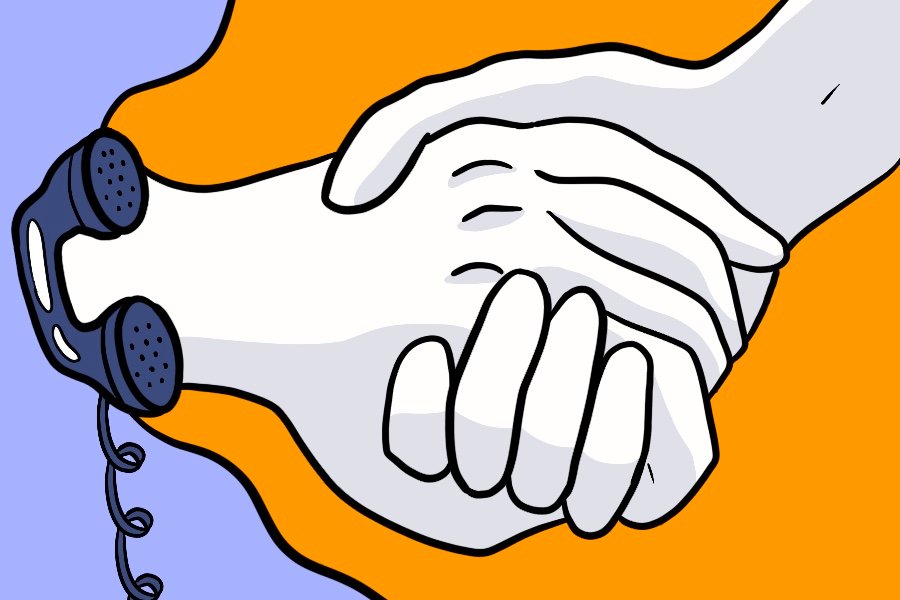Feinberg students join TeleHelp Ukraine, a free medical consultation program for Ukrainians overseas
Daily file illustration by Olivia Abeyta
TeleHelp Ukraine connects Ukrainian patients to U.S. and Ukraine-based physicians virtually and free of charge.
July 21, 2022
Eva Morgun, a Feinberg seventh-year M.D.-Ph.D. graduate student, was approached in April about a new nonprofit telehealth program called TeleHelp Ukraine designed to provide free medical consultations for Ukrainian people in Ukraine and Poland in the wake of the war.
Morgun, who was born in Kharkiv, Ukraine, has since become the director of operations for the organization. TeleHelp Ukraine is made up of medical students, graphic designers and more than 60 clinicians — including volunteers from various universities like University of California San Diego, Harvard University and Northwestern.
“This is something I really care about, and it’s just wonderful to see all the outpouring (of) support that we had with our interpreters, our various volunteers and our physicians, but also in addition to individuals who have a family connection like me,” Morgun said.
According to the World Health Organization, there have been 382 attacks on health care in Ukraine between Feb. 24 and July 13. These attacks have affected health facilities, transport, personnel, patients, supplies and warehouses.
TeleHelp Ukraine, started by a group of Stanford University medical and computer science students with support of the Ukrainian Students Association at Stanford, provides medical advice in a variety of areas, including cardiology, dermatology and neurology. The service also provides mental, women’s and children’s health consultation.
Morgun said patient outreach was limited at first, but TeleHelp Ukraine has recently gained a more significant presence. On July 3, Morgun appeared on the International Commercial Television network, the third-highest rated news station in Ukraine, to promote TeleHelp Ukraine.
TeleHelp Ukraine Executive Director Solomiia Savchuk promoted the service on ICTV a week later. Morgun said the broadcasts helped increase awareness of the organization, which now hosts about six to seven appointments per day.
However, Morgun said TeleHelp Ukraine is limited in some capacities due to its remote format.
“We are not a medical care organization, we’re a medical consultation organization,” Morgun said. “We provide a disclaimer to our patients that all we can do is give advice, and we can’t provide the same care as you would have in person in a clinic.”
A stable internet connection is also required for effective consultation sessions, which Morgun said makes it difficult for TeleHelp Ukraine to reach patients in active war zones.
Feinberg second-year student Alexandra Dejneka also volunteers for TeleHelp Ukraine. Dejneka, who is Ukrainian, helps translate medical documents into English and sometimes serves as an interpreter during appointments. She said the diversity of medical schools represented in the nonprofit presents additional opportunities.
“It’s been really great meeting medical students from all over who are all focused and excited about the same effort that we’re trying to provide for patients in need in Ukraine,” Dejneka said.
Yuliia Kohut, an incoming junior at Lincoln Park High School, is a health navigator and Ukrainian translator for TeleHelp Ukraine. She connected with the organization through her mother, Feinberg postdoctoral researcher Iryna Boiko.
Kohut said she originally planned to stay in her hometown of Ternopil, Ukraine, to finish her schooling, but those plans changed when the war broke out.
After moving to the U.S. in April, Kohut said Morgun introduced her to TeleHelp. She said she decided to join because she missed having the opportunity to help and volunteer in Ukraine.
“It’s really helping me to know that I’m helping my people because Ukrainians really need help during this terrible war,” Kohut said. “I am just happy that I am being helpful.”
Moving forward, one of TeleHelp Ukraine’s goals is to onboard new medical specialists in rheumatology, endocrinology, nephrology, oncology and psychiatry.
Morgun said many patients would benefit from these specialists, including her grandfather, who is currently in Ukraine.
“It’s just really meaningful that I can provide them something that they can use,” Morgun said.
Correction: A previous version of this article misstated Yuliia Kohut’s role with TeleHelp Ukraine. It also misstated who promoted the service. The Daily regrets the errors.
Email: pavanacharya2025@u.northwestern.edu
Twitter: @PavanAcharya02
Related Stories:
– Northwestern for Ukraine uses art to raise funds and awareness
– NU for Ukraine encourages students to register for first class offered on Ukrainian history



